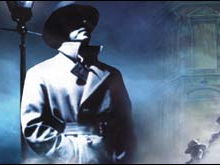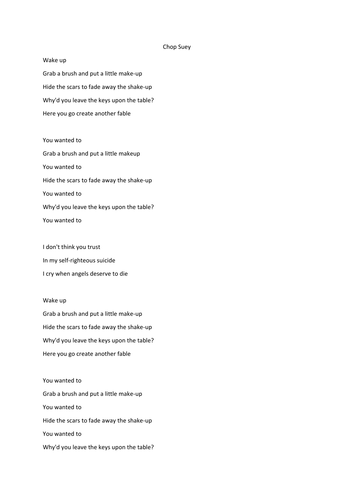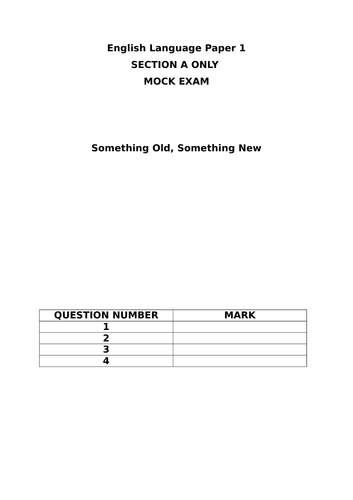
228Uploads
552k+Views
1374k+Downloads
All resources
Bundle

The complete AQA pack
All of my resources for AQA's English Language and English Literature exams covered. In one nice neat pack.

KS3: Creative Writing (linked to A Midsummer Night's Dream)
After teaching content related to AMND, we had changed direction and ended up doing some creative writing. These lessons build on some top end creative skills.
Bundle

AQA English Language Paper 2 UBER-BUNDLE
4 separate resource , all of which cover AQA English Language Paper 2. Also, I've added in a data collation resource that allows you to track the data.

AQA English Language Introduction (Paper 1 Section A focus) with supporting Workbook.
A series of lessons and resources designed to introduce year 9 students to the wonders of the AQA English Language Exam. In these lessons, I deconstruct the Assessment Objectives in relation to each question on English Language Paper 1 Section A.
I use the old Sunlight on the Grass story “Anil” as the source text (strictly speaking, this falls outside of what the exam could focus on, but I figure in using these stories as I have all this knowledge about them that isn’t being used!).
06/06/19: I’ve updated this to include a workbook that mirrors the activities in the powerpoint. Just fed up of dishing out lined paper and/or exercise books that’ll only get used for a few weeks.

AQA English Language Paper 2 Section A Revision Lesson
A single power point designed to be taught as a walking-talking mock examination. This can extend over several lessons - I predict you'll need at least three to do this justice. The source materials are included.

KS3: An Inspector Calls (introduction to the GCSE Literature paper)
A bare bones SoW that focuses on introducing the Literature aspect of study at KS3, but assesses the students on a piece of creative writing. The lessons assume you have a copy of the text for students to follow. Look at this as a starting point.
Designed with a bottom set in mind.

AQA A-Level English Language and Literature: Othello - Lesson 1
A reintroduction lesson that should be taught with the understanding that the students have read the text beforehand. Designed as an entry point into year 13; ideal for new teachers looking to get the measure of a new class (as in my case).
I found this lesson particularly useful when combined with FAR marking the material surrounding the quotations.
You should view this as a starting point - future lessons will get much more specific.

AQA A-Level English Language and Literature: Othello - Lesson 2 (Soliloquies)
My second lesson. Here, I focus almost entirely on ACT 2 SCENE 1 and Iago's soliloquies therein. The notes element of the power point pulls a lot of thinking together from across a lot of sources - you'll need these notes to flesh out the tasks. I tie it up with an exam style question at the end focusing on what we can infer about attitudes to women. Quite pleased with how this looks and how it goes.
Bundle

AQA -Level English Language and Literature Othello Bundle
All my Othello lessons (so far). I will keep adding to this as I go.
Bundle

Creative Writing Bundle
A whole mash of creative writing resources - some paid, some not - all in one place!

AQA English Literature: Introduction to Unseen Poetry lessons
Lessons designed to engage and interest my year 10s as they step into GCSE-land for the first time. They enjoyed the analysis of the song lyrics a lot.
I found that my previous classes found it very hard to engage with the poetry element. These lessons (combined with a couple of others that don't belong to me) worked well.

KS3: Introduction to KS3 Reading skills - Harry Potter focused
An introductory unit suitable for Year 7 students - I taught it to top and bottom set (with differentiation) classes. It is designed to get kids using the basic PEE style structure to create a reading assessment-worthy response. I don't include all of the extracts I used - I photocopied straight from the texts in all honesty - but this is more than enough to get going.
Hope you find this useful.

AQA Power and Conflict Poetry Scheme of Work
One power point per poem and some associated skills. I teach the poems in the order in which they appear in the anthology (except Tissue; I put that one at the end).
I follow a pattern with the lessons and source the contextual information from the BBC Bitesize website (and a couple of other places when I get bored of them) - it makes sense as any student that misses out on something can go and find what they need relatively quickly. The material is readily available elsewhere, hence the relatively low price for so many lessons.
NOTE: I have upgraded these lessons now. I’ve moved away from endorsing the PEEL style responses - the exam reports indicate clearly this is the thing to do. Additionally, I have included much more of a focus on the POWER themes. Lastly, I have used these poems as a springboard to discuss gender issues - part of this is my attempt to narrow the gender gap at the top end of GCSE English achievement by trying to get the lads to be more engaged with the material.
These lessons are designed to work in tandem with my own version of the poetry anthology. At the moment, I have yet to upload the edited version but I shall do so soon. That being said, the power points wouldn’t take much editing to use them with the traditional AQA version. All of the original lessons are included just in case you are still using the PEEL method of building a response.
Bundle

AQA English Language Paper 1 Section A Mock Exam Pack
A collection of Mock Exams relating to the AQA English Language Paper 1 Section A. Funny that, given the title and all...
Bundle

AQA English Literature Paper 2 Bundle: Modern Texts and Poetry (version 2)
Three complete units of work that go through the teaching of An Inspector Calls, all 15 of the Conflict and Power poems AND a selection of Unseen Poems. I've included a version of the poetry anthology I've created that lends itself to annotating and revising better than the AQA version too - bit of a beast that. Also, you will find attached a spreadsheet that allows you to track the scores for all of these components.

AQA English Language Paper 1 Section A Mock Exam - Something Old, Something New
I've found another use for all that knowledge we have about the old AQA English Lit anthology (The Sunlight on The Grass anthology). I have started to turn them into English Language Paper 1 Section A Mock Exams!
This is one of them. There is no mark scheme, but if you use the Paper 1 mark scheme from the AQA website you should be fine.
This one uses the start of Something Old, Something New.
Bundle

AQA English Literature Paper 1 Bundle
Jekyll & Hyde, A Christmas Carol and Romeo & Juliet resources PLUS a spreadsheet to track them all.
Bundle

AQA English Literature - Complete approach
All of my AQA English Literature resources at GCSE level in one bundle. Covers the following texts:
DNA
An Inspector Calls
Jekyll and Hyde
A Christmas Carol
Conflict and Power poetry
Unseen poetry
Romeo and Juliet
Macbeth
The bundle also includes a tracking spreadsheet for GCSE Literature.




















